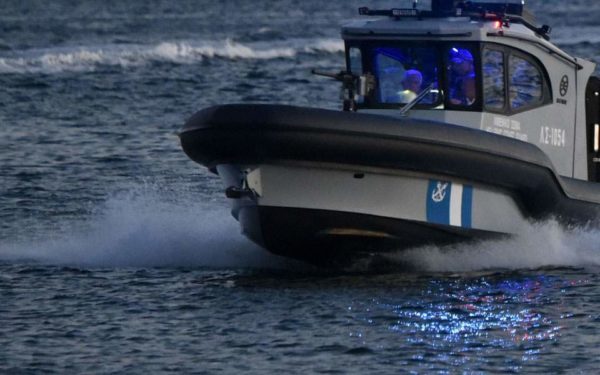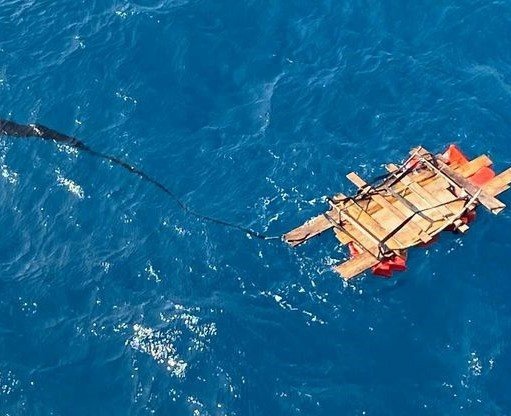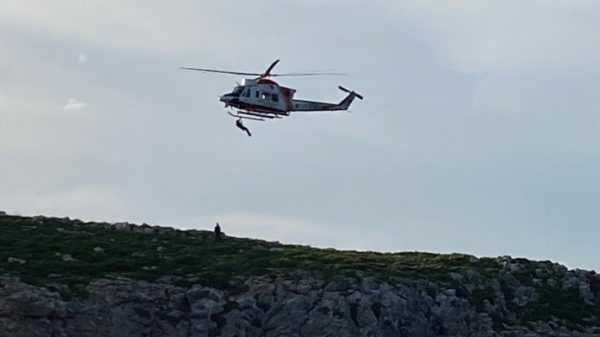The respondent is 20 years old and from Gaza. On Wednesday, 26 January at night, a group of 23 people left the Turkish coast on a rubber dinghy from Çeşme. 13 of them were from Palestine, 7 from Somalia, 2 from Yemen and 1 from Syria. Among them were three women and two minors.
After driving for two and a half hours, they arrived at Chios at around 3am. They had the location of Viale camp saved on their phone and arrived there, after walking for two and a half hours, at around 6am.
The whole group made it to the camp, but when they arrived, they split up. Some of them went directly to the police, others went into the camp. The respondent reports that he and his friend went into the camp. From there, he tried calling UNHCR. He had called the agency’s Chios number the previous day already when he was still in Turkey. At that time, they told him they could not do anything since he was not in Greece. It was reported that nobody picked up throughout several attempts. The respondent and his friend waited until 10am when the camp residents started forming a line for food distribution. The respondent and his friend stood in line as well. While they were waiting, he kept calling UNHCR. Shortly after 10.30am, he got through and was connected with an Arabic translator who told him not to be afraid and said “don’t go to the police, stay in the camp and wait for UNHCR to get to you”. The respondent reports that they were instructed to wait inside the camp, right next to the entrance. About 30 min later, two women arrived. One of them was described as rather young and wearing a vest with the UNHCR logo on it, the other was an older woman with red hair who was acting as a translator. She was European and spoke Arabic, but not very well. The women asked the respondent and his friend why they had come to Chios. In response, the two men explained that they were from Gaza and there was a war there so they wanted to apply for asylum. The women told them “you are safe now, don’t worry, we will call the manager to come to the camp”. No Covid measures were taken – no masks distributed, no hand sanitizer provided.
About 10min later, sometime between 11.00 and 11.30am, a man arrived, appearing to be the camp manager the two women from UNHCR had called. He too asked the respondent and his friend where they were from and they explained. Then he asked them if they had gone to EASO or the police. The respondent explained that they did not as they were scared to be pushed back to Turkey if they did. The camp manager replied “It’s ok. I will take you to the registration. Don’t worry, you are safe now. There will be no problem. I will take you to the police, they will ask you a few questions, then you will go to quarantine. You are safe.”
The women from UNHCR left and the camp manager took the respondent and his friend to a big building inside the camp. It was described as grey and white and had the UNHCR logo on the external walls. Inside, the respondent reported about 30 police officers were present. There were several rooms like in an office.
Inside this building, two of the Somalis that had crossed the sea together with the respondent and his friend were already waiting.
A police officer then reportedly took all their belongings (phones, money, jackets, backpack with their supplies as well as their shoes) and said they would have it all returned after questioning.
The respondent explains how subsequently, the two Palestinians and two Somalis were taken to a small room which had wooden walls and was empty apart from a toilet. 15 minutes later, two officers came and told them to get out. Reportedly, through an emergency exit door, they took the four men out the back of the building where a white transporter with a black or blue line but no writing or logos was waiting. It was described as having 12 seats. Two officers entered in the front. They were also wearing blue uniforms, but unlike the 30 officers inside the building, they did not have any flags or any text or badges on their uniforms.
When they started the car, the respondent reported that a UN jeep had just arrived at the site. For a few minutes, the UN jeep followed the transporter, but then it took another turn and left.
After a 15 minute drive, the respondent states that the transporter arrived at a port with many ships. Reportedly, one man in civilian clothes arrived. The respondent described how he he grabbed the two Somalis on their necks and dragged them into a building. Then he came back for the two Palestinians. The respondent recalls seeing EASO and UNHCR logos on the building and an EU and Greek flag on poles.
Inside the building, all four were taken upstairs into a room with four bunk beds. They had to stay there for around five hours. They were provided with some water and food.
The respondent reports that at around 7pm, a man dressed in black clothes and wearing a balaclava and carrying a big torch entered the room and told them “go, go, go, get on the bus!”.
Two more “masked men” were waiting downstairs. The respondent and the other three were taken on the same bus as before and driven to the shore. The drive took around 10min. It was dark when they arrived at the shore. The respondent reported that there was a jetty, and a boat was waiting there.
As soon as they saw the boat, the respondent and his friend started running away. “I saw the boat and I knew they would take us back to Turkey. I would rather die than go back to Turkey.”
The respondent describes running for about 2km before one of the masked men caught him. The masked man reportedly called one of the others and the transporter came to pick them up. The respondent’s friend was inside too as he had been caught as well.
The masked men put the respondent back into the transporter and told him “No stress, no fear!”. When they arrived at the shore again, the masked men are reported to have tied the hands of all four of them behind their backs with zip ties. The respondent recalls screaming “don’t return me to Turkey, I will die! Kill me, but don’t return me to Turkey! Kill me now, I’m done with my life!”
The respondent states that the masked men told him not to worry and to relax and that there was no problem. They took the two Palestinians and two Somalis to the jetty and from there onto a boat. The boat was described as a dark grey boat of medium size, neither a panther nor a RHIB boat, but one very similar to the one in this picture just without any insignias of the Greek Coastguard (or any other insignia).

On that boat, reportedly three other men were waiting. They were described as wearing green camouflage uniforms, balaclavas, black holsters and carried wooden sticks. One of them reportedly grabbed the respondent by his hair and brutally pushed him into the boat while ripping out a lot of his hair (he now has a bald spot there). As soon as all four of them were on board the boat, one of the three uniformed men started the engine. The other two approached the respondent and his friend who too had tried to run away at the shore. The respondent stated that they started beating both of them with the wooden sticks all over their bodies. The respondent believes the beating lasted at least 10min and recalls that he almost lost consciousness.
The respondent describes the boat as driving very fast for a total of 15-20min and then stopped nearby a small, uninhabited island. The uniformed men then reportedly cut the zip ties off the Somalis and Palestinian and handed them each a life jacket and ordered them to put them on.
Then, they reportedly threw them into the sea about 100m from the island. “None of us could swim!” proclaims the respondent. “We were crying and swimming and crying and swimming”.
They eventually reached the island which was uninhabited. “There was nothing, not even trees!”.
The respondent states that for three days, the four men were stranded on this small island. “We were so hungry and thirsty, we drank water from the sea and ate twigs of bushes.”
Getting increasingly desperate, at some point they started building a raft of debris and trash they collected on the island. They tested it but it could only support one of them. On the morning of their third day on the island, Sunday 31. of January, the respondent explains that one of the Somalis went on the raft and left the island, trying not necessarily to get to Greece but just anywhere on land to at least survive or even organise help for the other three. “It looked so dangerous but we thought we were already dying, so it didn’t matter” recalls the respondent.

On the same day, at around 3 or 4pm, the respondent reports that a big ship of the Turkish Coastguard approached the island. The respondent was so relieved and happy that he just went into the sea trying to reach the boat. The coast guard officers screamed “No, no, don’t do that!” (in Turkish) and turned their ship away from the island again.
“I had lost all hope before. You cannot imagine what seeing that ship felt like” explains the respondent.
For around 30min, the ship observed the island from a distance. Then, a helicopter arrived. One by one, the three of them were taken aboard the helicopter who then took them to the port of Çeşme. “As soon as I was on the helicopter, I was begging for water and food. When we got to the port, they gave us water and chocolate and other snacks.”
The respondent does not know how the Turkish Coast Guard knew about their presence on the island.
All three were subsequently detained for one week. One of the officers at the detention site reportedly asked the respondent to provide the number of UNHCR he called when he was on Chios.
During the recording of the testimony, the interviewer recalled having seen a social media post about a young Somali man who was found aboard a self- made raft by a Greek ferry off of Chios. She presented the respondent with a picture and he identified that it was indeed the raft they had built.
The Turkish Coast Guard released information on and pictures of the incident the day after.

